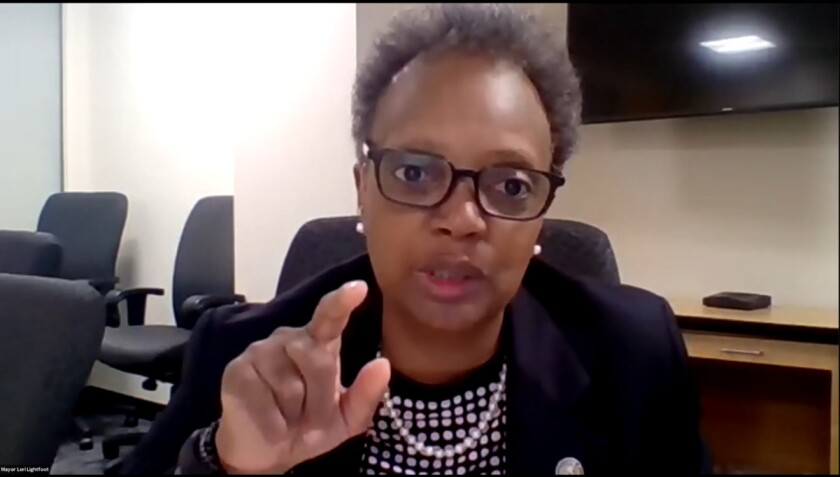For Tracy McKenzie, getting into the inaugural cohort of Yield Chicago meant he got to share his dream project directly with Mayor Lori Lightfoot on Tuesday and get a thumbs up.
McKenzie is one of eight local emerging developers of color being paired with seasoned developers and given one-on-one technical assistance from LISC Chicago as they tackle revitalization projects on the South and West sides under the new initiative.
Yield Chicago’s mission: Build capacity among more POC developers, helping them break into the predominantly white commercial development industry.
“The name is intentional. ‘Yield’ means to create more, because our communities deserve more investment. And it means to move to the side to let others through, the recognition that this industry is primarily white, and that it needs to be more inclusive and equitable,” LISC Chicago Executive Director Megan Harte said at a virtual event attended by Lightfoot.
Through Yield Chicago, LISC and partner Urban Land Institute Chicago, seek to bolster POC developers to take on greater roles in the rebuilding of Chicago’s South and West sides, a focus of Lightfoot’s Invest South/West initiative that has projects percolating.
Yield Chicago is being funded by JPMorgan Chase and The Pritzker Traubert Foundation.
In the works since last year, the initiative launches as the spotlight is turned on structural racism, calls for its deconstruction rippling across all industries and sectors of society.
“In Chicago, our work is focused on the South and West sides, in primarily Black and Brown communities, but what is noticeable is the lack of Black and Brown representation in the institutions investing and developing in those communities,” Harte said.
“It’s not enough to call out the fact that people of color are underrepresented in this industry. It’s not enough to just talk about it being a problem and not do anything.”
The initiative goes beyond mentoring, creating a supportive think tank charged with bringing cohorts’ projects — like McKenzie’s 260,000-square-foot cold storage facility proposed for the West Side — to fruition. McKenzie’s project would bring at least 105 jobs.
Cohort proposals are neighborhood-based, commercial real estate projects focused on retail, office space, restaurants, recreational facilities and/or mixed-use developments.
“We are here today because we’re all-in,” said ULI Executive Director Cindy McSherry, whose group supplies the mentors. “Yield is all about action and creating connections. Our work has always been about building more resilient communities — that now more than ever.”
McKenzie has been director of asset services at commercial real estate firm CBRE for six years. Prior to that, he spent 19 years at U.S. Equities Realty.
“My interest in development was sparked by watching my old boss’s career at U.S. Equities,” he said.
“The project that we envision is a medium-sized cold storage facility. We see it providing three shifts of work, about 35 jobs per shift, plus some office support. We need 18 to 24 acres of land for that, and the three sites that we have located all fit that bill,” he told the mayor.

Ensuring developers of color have a role in rebuilding historically neglected communities targeted by the city’s $750 million Invest South/West initiative is a priority, Mayor Lori Lightfoot said Tuesday at an event unveiling “Yield Chicago,” an initiative to help developers of color break into the predominantly white commercial development industry.
Via Zoom
“I’ll make sure someone from our economic development team reaches out to you about your project. Let’s figure out how to get it done,” the mayor responded.
McKenzie spoke for his cohorts on the challenges that hinder many developers of color.
“We’d like a little more participation than being subcontractors, but the equity requirement is tough for us,” he said.
“That’s the barrier to development, to getting into the game. You’ll find people in the cohort with fantastic ideas, incredible backgrounds but low equity. So ways that we can bridge that gap can lead to great results.”
Ensuring developers of color have a role in rebuilding historically neglected communities targeted by the $750 million Invest South/West initiative — Auburn Gresham, Austin, Englewood, Humboldt Park, New City, North Lawndale, Quad Communities, Roseland, South Chicago and South Shore — is a priority, Lightfoot said.
“It’s not enough for us to say to the big guys who are mostly white, ‘Hey, cut a little piece off for Black and Brown developers. Give some of these folks a bit of the table scraps, maybe a little bit more than you’ve traditionally done.’ We’ve gotta do better,” the mayor said.
“It’s critically important that we support Black and Brown developers, and we’ve got to make sure we empower our people to be able to run these projects, get the financing that they need, to demonstrate and show young people in these neighborhoods that there is a path forward for them. That doesn’t work if it’s some big amorphous company that doesn’t have a presence in these neighborhoods. That’s not how we get it done. ”





